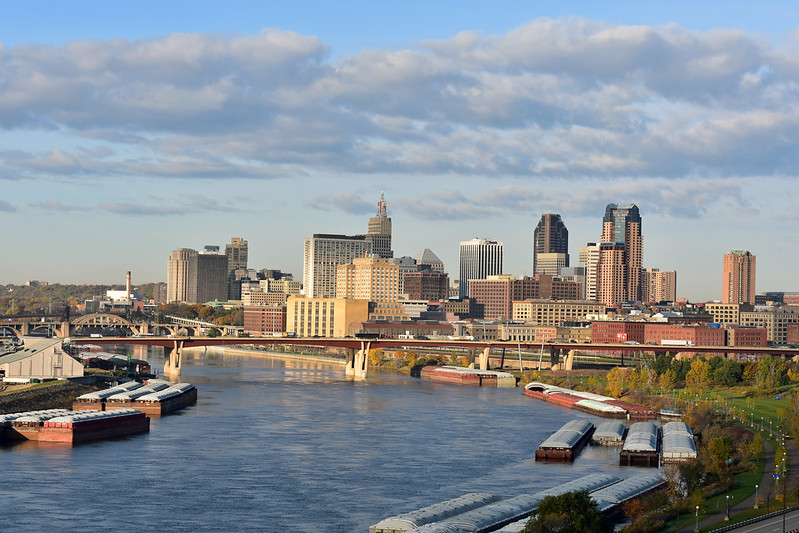FMR to MN Environmental Quality Board: Include climate change in environmental review
On Monday, March 22, FMR submitted written comments to the Minnesota Environmental Quality Board in support of their draft recommendations on integrating climate change into the state's environmental review process.
The comments were part of an ongoing public comment period seeking feedback on whether and how to account for climate change when conducting environmental reviewing. This includes both the project’s impacts to greenhouse gas emissions, as well as how the project itself may be impacted by the results of climate change in the future.
Below are FMR’s comments to the board in support of their proposal:
----------------
Monday, March 22, 2021
To: The Minnesota Environmental Quality Board
520 Lafayette Road North
St. Paul, MN 55155
Env.Review@state.mn.us
Re: Climate change & environmental review
Dear members of the Minnesota Environmental Quality Board (EQB),
On behalf of Friends of the Mississippi River, thank you for the opportunity to provide comments on the EQB’s Environmental Review Implementation Subcommittee (ERIS) draft recommendations on integrating climate information into MEPA program requirements.
The Mississippi River and climate change
Friends of the Mississippi River is a 501(c)3 non-profit organization dedicated to protecting, restoring and enhancing the Mississippi River and its watershed in Minnesota. We recognize that failing to achieve Minnesota’s climate mitigation and adaptation goals will have serious consequences for water quality, aquatic life and recreation in the Mississippi River, and poses extreme public health and economic risks for river communities.
In 2007, the Minnesota Legislature passed into law the Next Generation Energy Act (Minn. Stat. § 216H) setting statewide greenhouse gas emissions (GHG) reduction goals and requiring the tracking of specific GHG emissions.
Unfortunately, recent MPCA data indicate Minnesota fell short of its goal to reduce climate pollution 15% by 2015, and we are not on track to achieve a 25% reduction by 2025. It is clear to us that more must be done to address this important issue.
The EQB’s proposal is a modest but important step toward improving Minnesota’s climate performance and the long-term health of the Mississippi River.
Improving climate-smart decision-making
Today, the impacts of climate change are not consistently considered in Minnesota’s environmental review processes. To improve environmental performance, the state must begin to evaluate two critical factors associated with any large project proposal:
- Lifecycle emissions: the lifecycle GHG emissions of a proposed project and any associated mitigation activities; and
- Lifecycle adaptation: The ability of a proposed project to adapt to the anticipated impacts of climate change, including extreme precipitation, prolonged flooding, dangerous temperatures and punishing droughts.
Quantifying these lifecycle factors can help decision-makers reduce lifecycle GHG emissions, promote lifecycle resilience, protect public investments, improve environmental outcomes and provide for a consistent, comprehensive environmental review process that meets our current needs without compromising the ability of future generations to survive and thrive.
This approach is necessary and reasonable
The draft recommendations from the EQB Environmental Review Implementation Subcommittee align with both the goals of the Next Generation Energy Act and the Governor’s Executive Order 19-37 on climate change, and are a necessary and reasonable next step in accounting for both GHG emission from – and climate change impacts upon – proposed projects undergoing environmental review.
The draft recommendations appropriately address the core elements of a meaningful, consistent and predictable GHG evaluation approach. This includes defining a de minimis threshold for review, assessing the GHG emissions and climate impacts of a project, and evaluating the appropriateness of proposed mitigation activities.
This approach is inevitable
Achieving climate justice for future generations demands that we transition toward a carbon-neutral (if not carbon negative) global economy over time. It is therefore easy to imagine a future where every major project, product and economic transaction is evaluated (in part) through the lens of its lifecycle GHG emissions. In fact, on a long enough timeline, such a future is inevitable.
At some point, Minnesota is going to have to begin to conduct lifecycle GHG emissions and adaptation evaluations. We feel that beginning this process with the largest and most potentially impactful proposals is an appropriate first step.
Given the urgency of the issue and Minnesota’s failure to achieve adequate progress toward our GHG emissions reduction goals, we feel that now is the appropriate time to begin this important work.
We strongly support the EQB’s draft recommendations on integrating climate information into MEPA program requirements. Thank you for your important work.
Sincerely,
Trevor Russell
Water Program Director
Friends of the Mississippi River
-------
